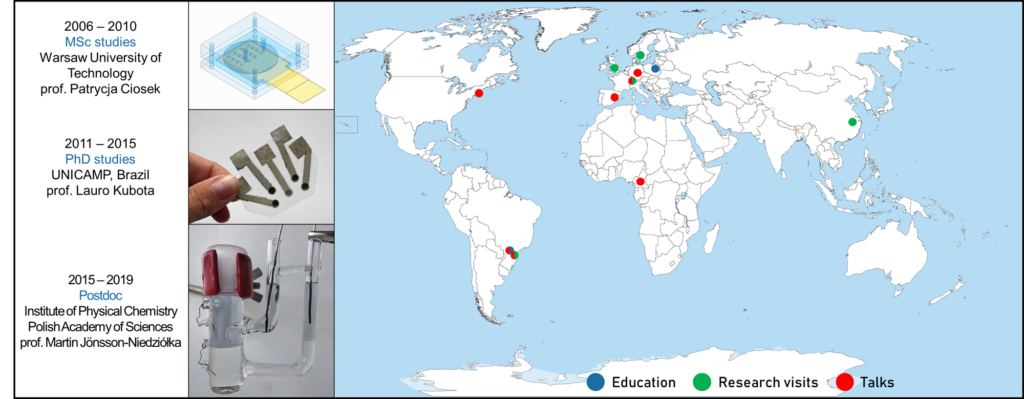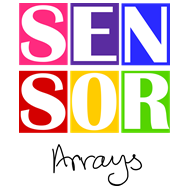
(drawing by Marlena Kruk)
I consider myself an analytical chemist with a passion for biology and engineering. My research topics roam around multielectrode arrays, electronic tongues, liquid-liquid electrochemistry, and low-cost sensors. After completing High School of Arts I decided to change from art to chemistry. I’ve enrolled on joined BSc/MSc programme the Warsaw University of Technology, where I first came across electronic tongue systems – arrays of sensors used instead of expert panels for automatic food analysis. At that time, I learned how to operate with cell cultures, create flow models in Comsol Multiphysics, and scratch the surface of multivariate data analysis. During laboratory internships in Poland and abroad, I got acquainted with work with different types of biological material: insects, protozoa, yeasts, and DNA.
I started my PhD studies at the University of Campinas in Brazil, where I developed my engineering skills by designing paper-based analytical systems that could be produced and used in places without access to advanced analytical laboratories (point-of-care tests). My thesis entitled „Analysis of samples of clinical and alimentary interest with paper-based devices.” written under the supervision of prof. Lauro Tatsuo Kubota was recognized with a Springer Theses award and published as a book. Ideas developed during that time allowed me to open a start-up company, Sensoliq Sp.zo.o. and triggered pop-science interest in the e-tongue technology with radio, journal, and blog interviews(i.e., Wired “Give the Robots Electronic Tongues”). Due to a severe condition of my at that time, unborn yet twins, I had to resign from a postdoc opportunity and come back to Poland. After the situation was under control, I found employment at the Institute of Physical Chemistry, Polish Academy of Sciences, where I still work today. During the work in the group of Martin Jönsson-Niedziółka, I have greatly expanded my understanding of voltammetric electroanalysis and discovered ion-transfer voltammetry. From January 2023 I’m leading the Sensor Arrays group.

Supervision
| BSc theses | |
| 2019 | Daniel Duszak, „Elektrochemia w układach mikroprzepływowych wyposażonych w trójwymiarowe matryce elektrod”, Cardinal Stefan Wyszyński University, Institute of Chemical Sciences |
| 2020 | Wojciech Mazurkiewicz “Mikroelektrody do pomiaru dopaminy, serotoniny i glutaminianu w hodowlach komórkowych i in vivo”, Warsaw University of Technology, Faculty of Chemical and Process Engineering, supervisor together with prof. Tomasz Ciach |
| MSc theses | |
| 2020 | Zuzanna Zambrowska, „Badanie warstw ochronnych elektrod umożliwiających długotrwałe pomiary elektrochemiczne w warunkach in vitro.” ,Warsaw University of Life Sciences – SGGW, Faculty of Animal Sciences |
| 2021 | Wojciech Mazurkiewicz, „Analiza elektrochemiczna elektrod z węgla szklistego modyfikowanych materiałami węglowymi pod kątem czułości i selektywności detekcji związków chemicznych o znaczeniu biologicznym” , Warsaw University of Technology, Faculty of Chemical and Process Engineering, supervisor together with prof. Artur Małolepszy |
| PhD theses | |
| 2020 | Marta Podrażka, „Novel Systems for Ion-Transfer Studies” Institute of Physical Chemistry Polish Academy of Sciences, auxiliary supervisor together with Martin Jönsson-Niedziółka |

2018, 2019, 2021 (∑ 1 month) visiting scientist EPFLValais Wallis/École polytechnique fédérale de Lausanne/Sion, Switzerland
19/11 – 26/11/2018 Erasmus+ laboratory visitor, Oxford Neuroscience/University of Oxford/ Oxford, England
23/09 – 30/09/2017 Erasmus+ laboratory visitor, Faculty of Chemistry and Chemical Engineering /Chalmers University/Gothenburg,Sweden
10/2010 – 12/2010 Trainee, Jiliang University, Faculty of Life Sciences, Hangzhou, China
07/2008 – 09/2008 Trainee, University of São Paulo, Biomedical Science Institute, São Paulo, Brazil
03/2008 – 04/2008 Trainee, Institute of Biochemistry and Biophysics, Polish Academy of Sciences, Genetics Department, Poland
11/2007 – 01/2008 Trainee, Institute of Biochemistry and Biophysics, Polish Academy of Sciences, Laboratory of Antymetabolites, Poland



